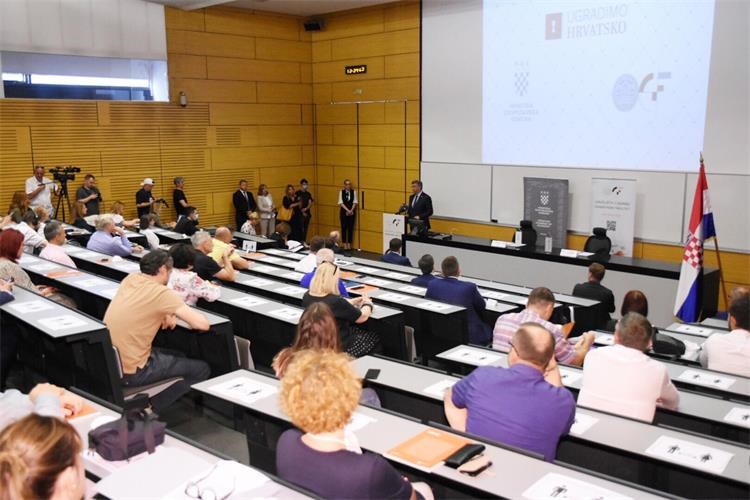- Published: 02.07.2020.
Post-quake reconstruction law has to be adequate, transparent and sustainable in the long term
Prime Minister Andrej Plenkovic on Thursday said that a framework for the reconstruction of Zagreb and its environs must be long term and sustainable, underscoring that the relevant act will be one of the first bills that the Sabor will adopt after the parliamentary election.
Plenkovic addressed a conference for stakeholders in the process of reconstructing buildings damaged in the 22 March earthquake.
The event, organised by the Faculty of Civil Engineering together with the Croatian Chamber of Commerce (HGK). revolved around cooperation between science and the economy in the post-quake reconstruction.
Plenkovic recalled that the government had prepared a bill and that its draft has passed public consultation and 391 comments were submitted by experts in construction, urban planning, architects, art historians, law experts and so on.
He underlined that the bill would be one of the first that the new legislature will adopt after the parliamentary election. He appealed for a broad consensus stressing that reconstruction is not a topic for just one political party or just the central government or city authorities.
"This has to be a framework that will be long term, sustainable, transparent, clear and will enable a quality and thought-out reconstruction of the city," he said.
He said that this will be a milestone and that experts need to come up with the best plan for the historical centre of Zagreb.
"To prepare a bill and adopt it in some super urgent procedure without public consultation would be profoundly and fundamentally wrong," he said underlining intensive activism by some people in the Opposition who simplify the framework for the preparation of the bill.
Earthquake in Zagreb and Gunja floods not the same
He said that this is not a situation to be taken lightly and added that the situation with the flooding in the eastern town of Gunja in 2014 is not the same as the earthquake had struck the capital city
"The capital city with its historical centre which has a heritage value with more than 25,000 buildings damaged is simply not the same," he said.
He explained that EU donor conferences are not intended for EU member states but as aid to other international partners organised by third countries while EU member states can absorb money from the Solidarity Fund.
He recalled that the total estimated value of the damage caused by the earthquake amounts to HRK 86 billion, 60% of the annual state budget.
A $200 million agreement has already been signed with the World Bank and is earmarked to reconstruct health and education infrastructure. Furthermore, an application has been submitted for funding from the Solidarity Fund and that €600 million can be expected from that.
He added that the government is endeavouring to obtain funds from other international financial sources such as the future multi-annual financial framework and the Next Generation EU instrument and is counting on a total of €22 billion in the next seven years.
Budget revision to provide HRK 141 million for emergency repairs
Plenkovic recalled that the revised budget had secured HRK 141 million for emergency repairs to roofs, support walls, chimneys, lifts, boilers.
The government will also subsidise rent for people who cannot move into their own homes as well as is covering the complete costs of their current accommodation in the Cvjetno Naselje student dormitory which amounts to HRK 2.5 to 3 million a month.
Faculty of Civil Engineering and HGK ink cooperation agreement
An agreement of cooperation was signed between the Faculty of Civil Engineering and HGK which represents a formal step in an already existing partnership.
HGK President Luka Burilovic said that the agreement referred to Zagreb's reconstruction. It intends to connect competent young people from the faculty to conduct their practical work in companies that are HGK members, he explained.
Both he and Dean Stjepan Lakusic underlined that development projects must include local engineers, operating staff and producers.
Text: Hina
